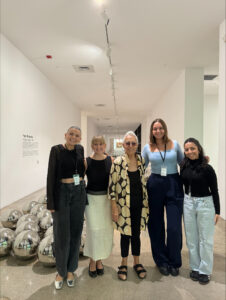
Photo of Kate Hoppe (second from left) with Rubell Museum interns and museum founder Mara Rubell (center).
This summer, I had the wonderful opportunity to intern for the Rubell Museum in Miami, Florida. While larger than The Jule in both size and collection, the Rubell also differs from The Jule in one other distinct way: it is a showcase of the Rubell family’s private collection of contemporary art they’ve been acquiring since the 1960s. The Rubells moved to Miami from New York City in the 90s and founded the museum to help dissolve the perceived unapproachability of the art world and make local Miami residents feel comfortable in museum spaces. They were the pioneers of the Miami art world, sparking a demand from locals for more artistic spaces in Allapattah, a former shipping and transportation district of the city. I got to meet with the Rubells a few times and realized that apart from breaking down accessibility barriers, they also wanted to use art to help spread awareness of the underrepresented communities that many Miami artists are part of – a mission similar to The Jule in Auburn as an academic art museum.
During my time at the Rubell, I went on excursions to other museums, artist studios and galleries, and met many interesting people working in Miami’s art world, which allowed me to meet art world professionals and artists to better understand how certain aspects of the art world fuction. I visited Bakehouse, an old bakery factory that has been converted into artist studios, and met a few emerging Miami-based artists and saw what they were working on. I even met a young artist who is from my hometown in Lakeland, Florida and went to my high school; go figure! Another excursion took me to the Primary Projects gallery, which led me to meet two artists from Atlanta, Georgia, making a great connection with them due to their proximity to Auburn. While I was researching this residency program, I realized the gallery had recently presented a show by an artist I’d had the pleasure of meeting when I visited his home in Birmingham: Joe Minter – a pivotal Alabama artist whose work was recently displayed at The Jule in their Black Codes exhibition. It was such an exciting moment to recognize an artist that I know from my time at The Jule, see the national and global connections stemming from Auburn’s art museum, and makes me grateful that I have been able to learn from this institution the entirety of my academic career.
I also provided daily public tours in my role with the Rubell. I frequently gave tours at The Jule as a student guide, but leading tours at the Rubell helped me gain even more confidence in public speaking and made me more adaptable. I asked the Rubells to give me some words of wisdom as I start to venture out into the real world, and they told me not to care how you are perceived; do what you love and don’t hurt anyone in the process. I think this encapsulates what the Rubells have aimed to do since the 60s and speaks to The Jule’s mission as well. Working at the Rubell was such an eye-opening experience for me because it put into perspective just how much I have learned and grown during my time at Auburn and helped me to appreciate everything The Jule has and continues to teach me.


